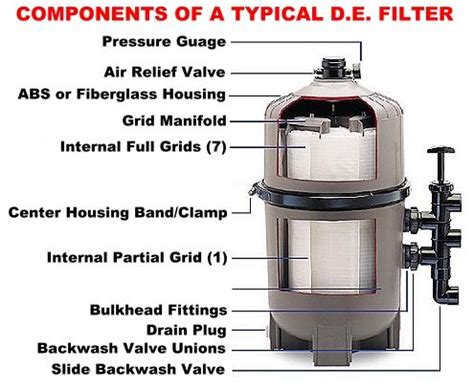Swim in Clean Water: A Comprehensive Guide to DE Filters
Maintaining sparkling clean water in your swimming pool is crucial for both hygiene and enjoyment. While various filtration systems exist, Diatomaceous Earth (DE) filters stand out for their exceptional clarity and efficiency. This comprehensive guide delves into the world of DE filters, helping you understand their workings, maintenance, and benefits. We'll answer common questions and provide the insights you need to keep your pool water crystal clear all season long.
What is a DE Filter?
A DE filter uses a unique filtration method to remove microscopic particles from your pool water. Unlike sand filters, it employs a thin layer of Diatomaceous Earth (DE), a naturally occurring, fossilized remains of microscopic algae. This fine powder creates a highly effective filter bed, trapping even the smallest contaminants, resulting in exceptionally clear water. DE powder is comprised of silica, and its unique structure allows it to create millions of tiny pores, leading to superior filtration compared to other methods.
How Does a DE Filter Work?
The process is relatively straightforward. Water from your pool is pumped through the filter, passing through the DE layer. The DE layer acts as a sieve, capturing dirt, algae, and other impurities. Once the water has passed through, it returns to the pool, clean and sparkling. Regular backwashing is necessary to remove the accumulated debris from the DE layer and maintain optimal filtration.
Advantages of Using a DE Filter
DE filters offer several key advantages over other filtration systems:
- Superior Filtration: DE filters deliver the clearest water due to their incredibly fine filtration capabilities. They remove particles significantly smaller than sand filters.
- Efficient Cleaning: While requiring more frequent backwashing than sand filters, this process is relatively quick and efficient, ensuring minimal downtime.
- Cost-Effective Long-Term: Although the initial cost might be slightly higher, DE filters often have a longer lifespan, reducing long-term replacement costs.
- Less Water Waste: Efficient backwashing reduces water consumption compared to some other filter types.
Choosing the Right DE Filter
Selecting the appropriate DE filter depends on several factors:
- Pool Size: Larger pools require filters with a higher flow rate and larger surface area.
- Pool Type: Above-ground or in-ground pools have different filter requirements.
- Budget: DE filters vary in price, depending on size, features, and brand.
Maintaining Your DE Filter: A Step-by-Step Guide
Regular maintenance is crucial for optimal performance and longevity. This includes:
- Regular Backwashing: Backwash your DE filter regularly, typically every 2-7 days, or when the pressure gauge indicates a significant pressure increase. This removes the accumulated debris and restores optimal flow.
- DE Replacement: The DE powder needs to be replaced periodically. How often depends on usage and water conditions. Always follow the manufacturer's recommendations.
- Inspecting the Filter Grids: Regularly inspect the filter grids for any damage or wear. Replace damaged grids promptly.
- Cleaning the Filter Tank: Periodically clean the filter tank to remove any buildup of DE or other debris. This helps maintain efficient operation.
Common DE Filter Problems and Solutions
Here are some frequently encountered issues and how to address them:
H2: My DE filter pressure is high. What should I do?
High pressure usually indicates a clogged DE grid. Try backwashing the filter first. If the pressure remains high after backwashing, the DE might be depleted, or the filter grids could be damaged.
H2: How often should I replace the DE powder in my filter?
The frequency of DE replacement depends on factors such as pool usage, water conditions, and the type of DE used. Generally, replacement every 2-3 months is a good starting point, but always check your filter's manual for the manufacturer's recommendations.
H2: How do I know if my DE filter needs to be backwashed?
The most reliable indicator is the pressure gauge on your filter. A significant increase in pressure indicates the filter is clogged and needs backwashing. Your filter might also show reduced flow rate or less clear water.
Conclusion
DE filters offer a superior solution for maintaining crystal-clear pool water. With proper care and maintenance, a DE filter will provide years of reliable service, ensuring you enjoy clean, refreshing swims all season long. Remember to consult your filter's manual for specific instructions and always prioritize safety when working with pool equipment.

